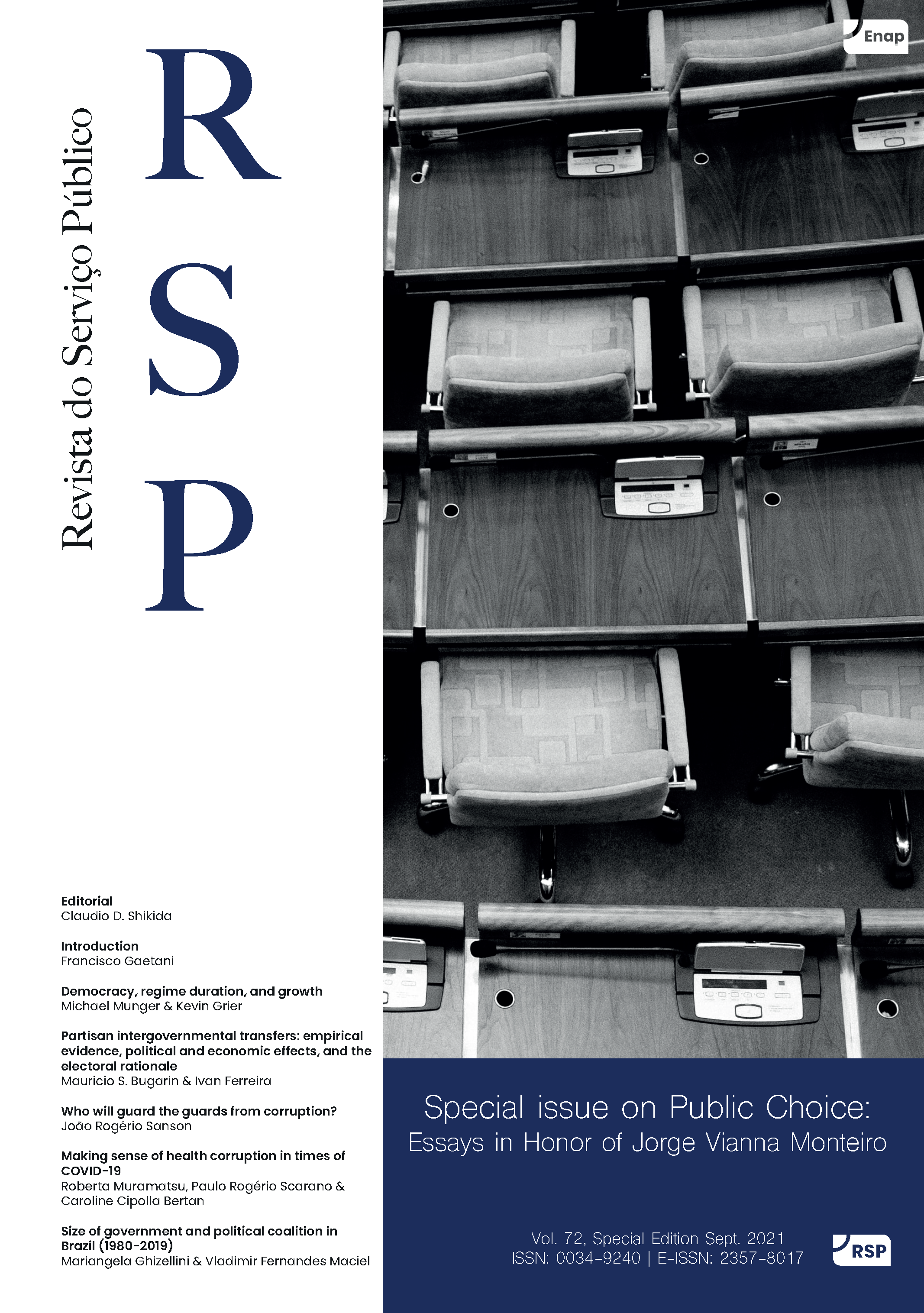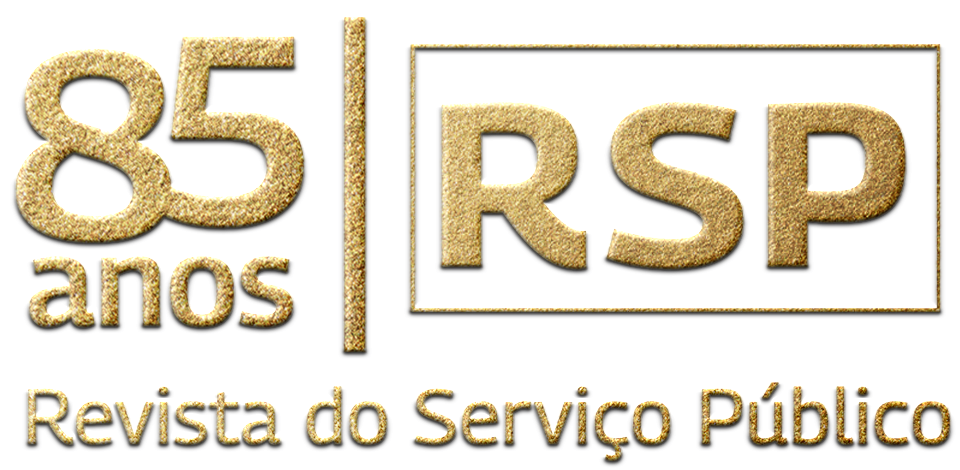Who will guard the guards from corruption?
Keywords:
corruption, political competition, free informationAbstract
Corruption is common in political and economic processes. Auditing is one of the options to fight it. Another option is the Judiciary Branch, supported by the Constitution and laws approved by the Legislative Branch. However, these auditors depend on a higher-level auditor as they can also be corrupt. Ethics in public administration evolves over time and is part of society’s culture, which may include tolerance to high corruption in a given period. Since the 1950s, the theory of competitive markets has been adapted to explain the competition between political agents running for public office. In this view, high competition is equivalent to a democratic political process. An essential element is the free access to information about the politicians’ acts during their tenures. In the long run, political competition reduces politicians' personal gains, including legal and illegal income, because of informed voter choices. Models of monopoly or firms with few competitors in markets are equivalent to authoritarian regimes under the control of the Executive Branch, which combines restrictions on critical information and high entry barriers for competitors. Also in the long run, the political monopoly seeks to at least restrict information about its acts of corruption, preserving personal gains, but attracting competitors. Due to weak contestation, achieving citizens' preferences for political ethics takes a lengthier and more turbulent period of adjustment under a monopoly. In any case, the voter will be the auditors' auditor and will be more effective in a competitive political situation.
Downloads
References
AIDT, Toke S. Rent seeking and the economics of corruption. Constitutional Political Economy, v. 27, n. 2, p. 142-157, 2016.
BECKER, Gary S. A theory of competition among pressure groups for political influence. The Quarterly Journal of Economics, v. 98, n. 3, p. 371–400, 1983.
BENTLEY, Arthur F. The process of government: A study of social pressures. Chicago: Univ. of Chicago Pr., 1908.
BUITER, Willem H. From predation to accumulation? The second transition decade in Russia. Economics of Transition, v. 8, n. 3, p. 603-622, 2000.
CHAFFEE, Wilber A. The political economy of revolution and democracy: Toward a theory of Latin American politics. American Journal of Economics and Sociology, v. 43, n. 4, p. 385-398, 1984.
DENNETT, Daniel. Breaking the spell: Religion as a natural phenomenon. New York: Viking, 2006.
DOWNS, Anthony. An economic theory of democracy. New York: Harper & Row, 1957.
HAWKING, Stephen W. A brief history of time: From the big bang to black holes. London: Bantam Books, 1988.
HOTELLING, Harold. Stability in competition. Economic Journal, v. 39, n. 153, p. 41-57, 1929.
JAIN, Arvind K. Corruption: A review. Journal of Economic Surveys, v. 15, n. 1, p. 71-121, 2001.
JESSOP, Bob. The capitalist state. New York: New York University Press, 1982.
LEFF, Nathaniel H. Economic development through bureaucratic corruption. American Behavioral Scientist, v. 8, n. 3, p. 8-14, 1964.
MILLER, Gary J. The impact of economics on contemporary political science. Journal of Economic Literature, v. 35, n. 3, p. 1173-1204, 1997.
MONTEIRO, Jorge V. Economia do setor público. Rio de Janeiro: Ipea, 1987.
MONTEIRO, Jorge V. Como funciona o governo: Escolhas públicas na democracia representativa. Rio de Janeiro: FGV Ed., 2007.
NORTH, Douglass C. Understanding the process of economic change. Princeton, NJ: Princeton University Press, 2005.
PEREIRA, Carlos; MELO, Marcus A. Reelecting corrupt incumbents in exchange for public goods: Rouba mas faz in Brazil. Latin American Research Review, v. 50, n. 4, p. 88-115, 2015.
ROSE-ACKERMAN, Susan. Corruption and government: Causes, consequences, and reform. 2nd ed. Cambridge: Cambridge Univ. Press, 2016.
SCHUMPETER, Joseph A. Capitalism, socialism and democracy. 3rd ed. New York: Harper & Row, 1950.
SMITH, Adam. The wealth of nations. Homewood, Illinois: Richard D.Irwin, 1963.
SVENSSON, Jakob. Eight questions about corruption. Journal of Economic Perspectives, v. 19, n. 3, p. 19-42, 2005.
WOHLGEMUTH, Michael. Economic and political competition in neoclassical and evolutionary perspective. Constitutional Political Economy, v. 6, p. 71–96, 1995.
Downloads
Published
How to Cite
Issue
Section
License
Copyright (c) 2021 Revista do Serviço Público

This work is licensed under a Creative Commons Attribution-NonCommercial-ShareAlike 4.0 International License.
- A RSP adota a licença Creative Commons (CC) do tipo Atribuição – Uso Não-Comercial (BY-NC).
- A licença permite que outros remixem, adaptem e criem obra licenciada, sendo proibido o uso com fins comerciais.
- As novas obras devem fazer referência ao autor nos créditos e não podem ser usadas com fins comerciais, porém não precisam ser licenciadas sob os mesmos termos dessa licença.
- Ao publicar o artigo na RSP, o autor cede e transfere para a ENAP os direitos autorais patrimoniais referentes ao artigo.
- O artigo publicado na RSP não poderá ser divulgado em outro meio sem a devida referência à publicação de origem.
- O autor que tiver o artigo publicado na RSP deverá assinar o Termo de Concessão de Direitos Autorais (em momento oportuno a editoria da Revista entrará em contato com o autor para assinatura do Termo).



